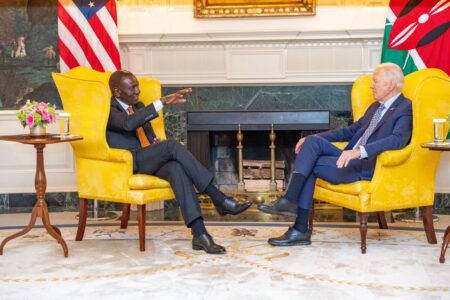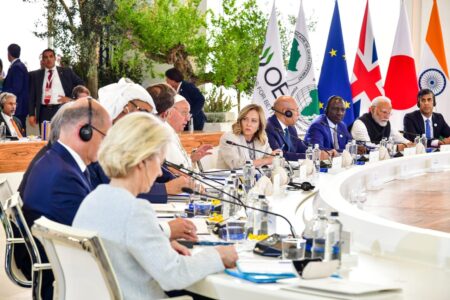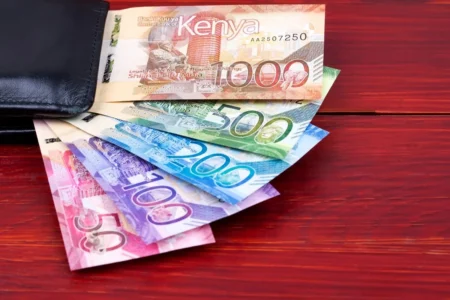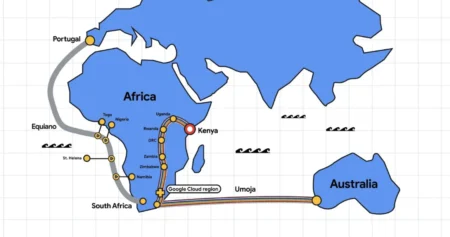The de-dollarization of international trade is not limited to BRICS nations but has become a trend in tandem with the shifts in the global financial landscape.
- A rising trend toward de-dollarization is challenging the longstanding supremacy of the United States in the international financial system.
- Lula revealed in January that Argentina and Brazil were exploring the possibility of a common currency as an additional step to curtail the US dollar’s dominance.
- BRICS’ strategic interest in Africa has undoubtedly strengthened South Africa’s position as a leading regional power and a gateway for other BRICS countries to the African market.
De-dollarization of international trade gathering momentum
The global financial landscape has undergone a remarkable transformation in recent times. Remarkably, the issue of the de-dollarization of international trade is slowly but steadily gathering momentum. A rising trend toward de-dollarization is challenging the longstanding supremacy of the United States in the international financial system. As the dominant global reserve currency, the US dollar remains pivotal in international trade, investment, and financial transactions.
Major economies, including Brazil, Russia, India, China, and South Africa – collectively called BRICS – seek to reduce their reliance on the US dollar. Concerns regarding the potential weaponization of the dollar through sanctions have inspired this move.
The de-dollarization of international trade is not limited to BRICS nations but has become a trend in tandem with the shifts in the global financial landscape. Many countries and regions now seek to diversify their foreign exchange reserves. The move will reduce exposure to the US dollar and explore alternative ways of conducting international trade and investment. This trend has gained momentum due to the need to safeguard economic interests. The recent changes in the global financial system have also gone a long way in inspiring currency shifts.
Lula rallying call to BRICS to the dollar’s dominance
Brazil’s president Luiz Inácio Lula da Silva, has urged developing nations to replace the US dollar in international trade with their currencies. Consequently, the South American leader has added his voice to the escalating efforts to end the dollar’s dominance.
Lula was undertaking his first state visit to China since assuming office in January. He urged the so-called BRICS group of nations to join forces and create a substitute currency for international trade. “Every night I ask myself why all countries have to base their trade on the dollar.” Lula said in an impassioned speech at the New Development Bank in Shanghai. “Why can’t we we do trade based on our currencies? Who decided that the dollar was the currency after the disappearance of the gold standard?” he asked.
During his state visit to China, Lula’s comments fueled the fire of the de-dollarization of international trade. Lula’s call to shed dollar dependence dovetailed with Beijing’s increasing efforts to promote the use of the renminbi in the settlement of cross-border trades. Chinese policymakers are seeking to strengthen the role of the world’s second-largest economy in the global financial system.
READ MORE: BRICS Countries keen on having common currency to replace US dollar
Economic relations to benefit from the de-dollarization of international trade
Over the past decade, bilateral trade between Brazil and China has grown exponentially, reaching $150,4 billion last year. China purchases agricultural products and minerals from Brazil. The world’s most populous nation also invests in Brazil’s consumer market and infrastructure sector. During his trip, Lula also visited Huawei, a Chinese telecom equipment manufacturer currently under US sanctions.
Growing economic ties have prompted both nations to advocate for increased use of their respective currencies in bilateral commerce. Chinese media recently reported that the Brazilian branch of China’s state-owned commercial and industrial bank completed its first transaction in renminbi directly within the country.
Since the Russian invasion of Ukraine, China’s share of trade finance has doubled to 4.5 per cent. Data from the global payments platform Swift indicates that the growth emanates primarily from a surge in shipments between China and Russia.
The BRICS nations examined a new currency based on a selection of member currencies last year. Incentives to shifddoll’sll’s the dollar’s dependence, which proved detrimental after Russia’ss dollar reserves were cut off due to its invasion of Ukraine, gave rise to the idea.
Lula revealed in January that Argentina and Brazil were exploring the possibility of a common currency as an additional step to curtail the US dollar’s dominance. Lula’s multilateralist approach to foreign policy is also reflected in the improving relations between China and Brazil. Brazil, for example, has recently acceded to the use of the yuan in cross-border transactions with China.
Africa’s place in the BRICS push for de-dollarization
BRICS’ strategic interest in Africa has undoubtedly strengthened South Africa’s position as a leading regional power and a gateway for other BRICS countries to the African market. South Africa has taken over the BRICS leadership from China. Moreover, the African nation will host this year’s BRICS Summit from 22 to 24 August 2023.
The BRICS leadership has promised to invite more African countries to attend the summit. The debate on the BRICS lead in the de-dollarization of international trade will expectedly feature in the summit. Moreover, South African President Cyril Ramaphosa has pointed out that he will use his chairmanship of the BRICS group of leading emerging economies to focus on advancing African interests.
“We want to use this opportunity to advance the interests of our continent, and we will, therefore, through the BRICS summit, be having an outreach process or moment where we will invite other African countries to come and be part of the BRICS because we do want BRICS in whatever BRICS does to focus on helping to develop our continent,” said Ramaphosa in January.
“Our continent was pillaged and ravaged and exploited by other continents, and we, therefore, want to build solidarity in BRICS to advance the interests, of course initially of our own country, but also the continent as a whole.”
Enhanced market access factor
The BRICS economic partnership has enabled increased market access while promoting broader mutual trade and investment benefits as part of a business-friendly environment. A crucial part of this strategy, particularly for Africa, is diversifying and expanding trade of more manufactured goods than raw commodities.
The BRICS accounts for about 25 per cent of global GDP, and China’s trade with Africa is more than four times of the US. Due to trade values, other African countries will seek to align with the BRICS. Moreover, a BRICS member, China, has been the primary financial lender to African nations. Taking off external debt repayments from the high costs of the US dollar denomination could also prove too good a temptation. The recent shifts global financial landscape will also remain pivotal in how Africa responds.
As of February, the US dollar’s dominance had considerably diminished within the Russian economy. The case is no different in the other BRICS and their close trading partners. The solidarity with the BRICS will help African countries gain greater access to the global economy. As such, African nations might hop on the bandwagon of the de-dollarization of international trade that the BRICS is championing.
READ MORE: BRICS Influence: Africa’s position in shifting global economic outlook











